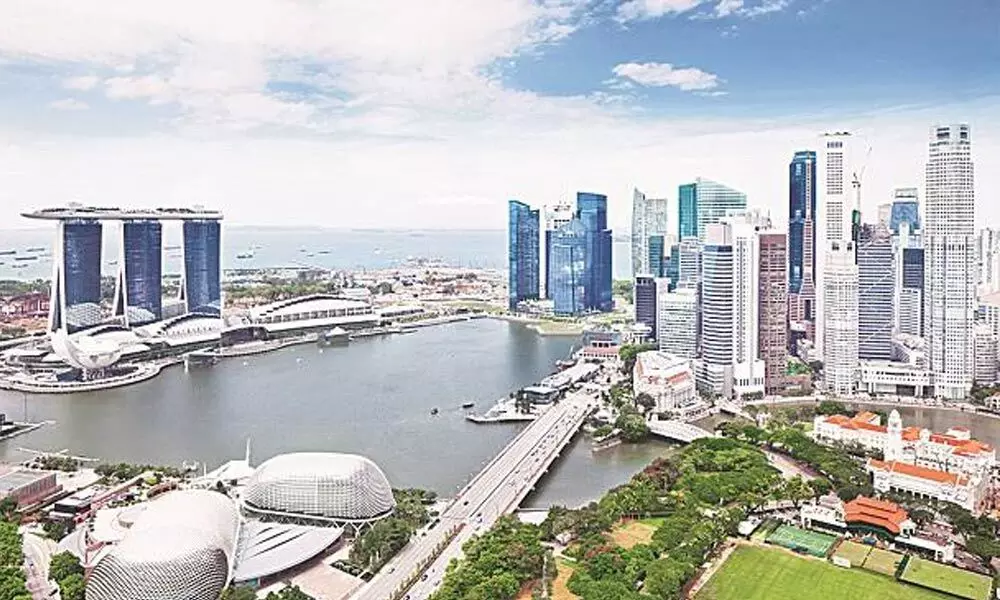Millennial investors in the digital age turning impatient
Younger investors would rather leave the creation of long-gestation assets to sovereign wealth funds and state institutions
image for illustrative purpose

The developer behind some of Singapore's most famous landmarks, such as Raffles City and Clarke Quay, has gone ahead and rebuilt itself. The restructuring tells us something about what it is that excites shareholders in the Asian financial center nowadays - and gives a taste of what is to come in many industries globally
The developer behind some of Singapore's most famous landmarks, such as Raffles City and Clarke Quay, has gone ahead and rebuilt itself. The restructuring tells us something about what it is that excites shareholders in the Asian financial center nowadays - and gives a taste of what is to come in many industries globally.
CapitaLand Investment Ltd, which made its debut in the city's stock market this week, is one of the world's largest real-estate investment managers, modelled along Blackstone Inc. Gone are the cranes and the excavators of what was earlier CapitaLand Ltd. Together with land parcels and semi-finished buildings, the development activity has been spun off into a privately held firm.
A previous generation of Singaporean investors swore by banks and builders: The former transformed short-term deposits into long-term loans, the latter transfigured reclaimed ocean land into shopping centers and condominiums. But millennials are impatient. A development cycle of three to five years - and lumpy sales - have meant a perennial discount to net asset value even for a highly efficient firm like CapitaLand.
Hence the rebirth as an asset manager. CapitaLand Investment has stakes in six publicly traded real-estate investment trusts, a very popular asset class in the Singapore market; it also has investments in more than 20 private real-estate equity funds. The new entity can keep adding to this S$78 billion ($58 billion) of funds under management to earn a steadier stream of revenue for shareholders than it could as a developer.
Then there are its 120,000 "keys," a fancy way to describe ownership of revenue-generating units such as longer-stay serviced apartments. That's another S$28 billion in assets. Throw in a pan-Asian footprint that includes China and India, and a first right of refusal on new structures being erected by the privately owned CapitaLand Development Ltd., and this Blackstone model can win.
At least the stock market has given it a thumbs up. CapitaLand investors who exchanged their shares one-for-one received, in addition to new stock, S$0.951 as cash and 0.155 units in CapitaLand Integrated Commercial Trust. The whole lot is worth more than S$4. Considering that the old developer firm's shares used to trade below S$3 before the reorganization was announced in March, a chunk of value has already been unlocked. Morgan Stanley's target price for the newly listed CapitaLand Investment shares is S$3.75, compared with their S$2.95 debut.
Will something similar happen to the world of money? Maybe in 10 years. As technologies like central bank digital currencies allow customers to hold deposits directly with monetary authorities, banking as we have known it since the advent of the 17th-century goldsmith-lender could become a relic. To stay relevant to markets, commercial lenders might have to reimagine their role. They would perhaps point yield-seeking households savings toward third-party investment vehicles, which they would back with some of their own capital: skin in the game. A fee for this service - plus a part of the investment profit - would garner revenue. Without expensive branch networks, costs would go down. The 15 per cent-plus return on equity that shareholders of large lenders have stopped expecting since the 2008 financial crisis could make a return.
Finance in the digital age may be all about owning cash-generating assets, bypassing processors who actively mold the putty, whether it's land, money or commodities like air travel. Airlines that burn jet fuel to produce passenger miles may never return to their pre-pandemic glory. But buying and selling assets at the right prices, financiers might still make money. As global travel inches toward a tentative recovery, aircraft lessors, who buy planes from Boeing Co. and Airbus SE and lease them on to airlines, now account for 60 per cent of deliveries, compared with pre-Covid-19 levels of 40 per cent-45 per cent, according to Reuters, which says that in the early 1970s, the lessors' share was as low as 1 per cent.
The makeover of CapitaLand may be emblematic of a trend that extends far beyond Singapore and real estate. The message that stayed with the 14th-century survivors of Europe's Black Death was that life is short. It may be no different now. Yes, land must be bought and developed and buildings constructed, but millennials would rather leave all that to more patient institutions like sovereign wealth funds and state investment institutions. They don't want to watch paint dry. (Bloomberg)

